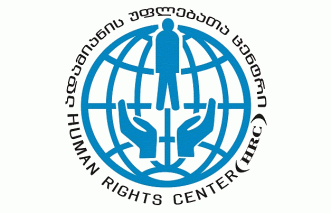Appeal of Human Rights Center regarding the Demolition of Houses of Individuals in Settlement Africa
December 19, 2020

On December 15, 2020, following the instructions of Tbilisi City Hall, in the so-called settlement Africa, up to 12 buildings, which at various times were built without permissions on the land owned by the capital city, were demolished by using special equipments. According to local residents, the demolished buildings were built by socially vulnerable citizens at the expense of bank loans as the only dwellings for these families.
Realization of the right to adequate housing in Georgia has remained a systemic problem for years. There is no government strategy and action plan for the protection of the homeless in the country. At the legislative level, we still do not have a complete definition of a homeless person and the framework legislation necessary for the realization of the right to housing, further, there is no unified database on homelessness.
In fairness, it should be noted that in Georgia, and especially in the capital, the practice of misappropriating state-owned properties has been a major problem for years. Consequently, there is a legitimate interest for the authorities to eliminate such practices. Nevertheless, the government including the self-governing units shall be always bound by human rights in the exercise of the powers. It is therefore imperative that any such action, including on a legitimate basis, be conducted in consideration of particular facts and with respect for human rights.
In this case, both the legal and political aspects of the decision of the Tbilisi City Hall must be taken into account. The preventive removal of illegal constructions in settlement Africa following the TV statements of the authorities including that of the mayor of Tbilisi, as well as taking into account the practice of misappropriation of the lands, actually provide grounds for a legitimate interest of the government to dispose the land on the state balance according to own views and political agenda. Moreover, the actions of the City Hall formally comply with the law.
The eviction moratorium, which applies nationwide, does not apply to illegally constructed buildings. Thus, the individuals living in settlement Africa are not formally considered to be evicted, despite the most severe social challenges they may face.
Regardless of the existence of a legitimate aim, every action of the government must maintain a fair balance, an equilibrium between the protection of property rights and common interests. Although, lawmakers may not neglect the public interest the administration of which is the direct prerogative of the government, at the same time, it is inadmissible to disregard the interests of specific individuals for the sake of protecting the public interest.
In the given case, the decision made by the City Hall coincided with the crisis created by the pandemic and the conditions of social isolation and distancing. While the government urges people to stay home and maintain social distance, at the same time, dismantling residential buildings in winter cannot be considered as a proportionate means of achieving the goal. Furthermore, before making a decision, the City Hall officials should have obtained detailed information about the needy persons or "misappropriators" who actually live there, especially about children, as the Children's Code provides for special obligations on the part of local self-governing units to take into account the best interests of the children when making any decisions.
As far as the principle of proportionality is concerned, only what is acceptable can be necessary, the disproportion of the decision of Tbilisi City Hall excludes the necessity. Consequently, in the conditions of a pandemic, the decision of the City Hall, in view of the worst social poverty and economic crisis in the country, is inconsistent with the standard of human rights protection, both legally and politically.
Moreover, the scale of the practice of the state property misappropriation in the country should be considered. Given the scale of illegally seized land or buildings across the country, only dismantling them in settlement Africa in the post-election period should be seen as a demonstration by the City Hall of a policy against illegal construction. However, in a situation where the State is unable to provide adequate housing to homeless people as soon as the eviction procedure is enforced, such a rigid policy does not meet human rights standards.
Human Rights Center calls on the Georgian authorities and all self-governing units:
- To immediately stop the process of dismantling of illegal buildings and prevent people from being left in the streets during winter and pandemic conditions;
- Taking into account the international standards, to adopt the legislation in line with the international standards providing the definition for homeless individuals and fulfilling the obligations under the right to adequate housing;
- To develop a unified government strategy and action plan on homelessness aimed at systematically addressing the problem;
- Local self-governments, within the municipal territories, to ensure the approval of the rules for registration of homeless and for providing them with shelters, and to ensure allocation of financial resources in the budget and maintaining a database to this regard.
Human Rights Center
News
December 13, 2023
Ethnic minorities outside the peace dialogue
November 6, 2023
‘Peace’ agenda of political parties
Popular
Articles
February 13, 2024



